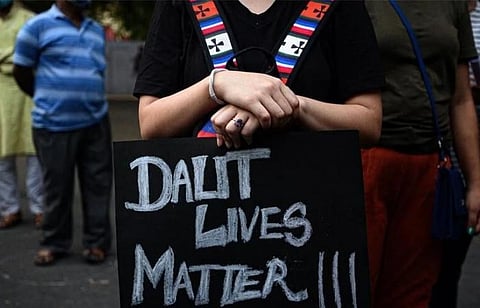
New Delhi: Sparking a discussion about whether casteism corrodes the world of classical arts in Kerala, Dr RLV Ramakrishnan, a Dalit Mohiniyattam dancer, on March 21 brought attention to what he perceives as institutionalised upper-class privilege within the realm of traditional dance.
According to him, “Kalamandalam” Sathyabhama, a proponent of Mohiniyattam, attempted to make “fair complexion and agreeable looks” a prerequisite for performing arts, which was “brazenly racist and insulting” to artists from underprivileged and marginalised communities.
In an interview with a YouTube channel, Satyabhama remarked that Ramakrishnan, 48, had “crow” skin and that he wasn’t “beautiful enough” to perform Mohiniyattam.
She later informed reporters that she stood by her remarks.
Her comments sparked outrage and drew condemnation from various quarters in Kerala. It has been described as “discriminatory” and “offensive” in nature.
Those opposing the remarks said she not only targeted the individual but also perpetuated gender and color-based stereotypes.
Ramakrishnan has said that he will file a police complaint against her. He has sought legal aid for a potential defamation case. He emphasized that such remarks not only targeted him personally but could also discourage future generations from pursuing classical art forms if they don’t conform to certain standards of beauty.
Politicians from both the ruling Communist Party of India (Marxist) and the Congress have criticised Sathyabhama’s remarks and expressed support for Ramakrishnan.
K Radhakrishnan, the minister for SC/ST welfare, stated that such thinking is unacceptable, and action will be taken if a complaint is lodged.
The Kerala Kalamandalam, a prestigious institution for traditional arts, has disassociated itself from Sathyabhama’s comments, describing it as “unfit for a cultured society”. They clarified that Sathyabhama has no current affiliation with the institution apart from being a former student.
The controversy surrounding Sathyabhama’s comments underscores the importance of promoting inclusivity, diversity and respect within the arts community, as well as addressing issues of caste discrimination and biased beauty standards.
The Kerala Human Rights Commission on March 22 took suo motu cognizance of the alleged colour-tinged casteist remarks and directed the Thrissur district police chief and secretary of the Department of Culture to submit a report within 15 days.
The order was issued based on media reports.
Moreover, a separate complaint in this regard has been filed by rights activist Guinness Madasamy.
The distasteful comments suggest that there are systemic biases favoring individuals from upper-class backgrounds within the traditional dance scene, potentially hindering the opportunities available to artists from less privileged backgrounds. This situation mirrors broader societal inequalities that persist in various domains, including the arts.
In many traditional art forms, including Mohiniyattam, there may exist a historical association with certain social classes or communities. This association can inadvertently lead to the marginalisation of artists from lower socio-economic backgrounds, as they may face barriers in accessing training, performance opportunities, or recognition within the field.
Ramakrishnan’s assertion highlights the importance of addressing issues of privilege and equity within the traditional arts community. Efforts to promote inclusivity, diversity and equal opportunity can help create a more accessible and equitable environment for artists from all backgrounds to thrive and contribute to the rich tapestry of cultural heritage.
You can also join our WhatsApp group to get premium and selected news of The Mooknayak on WhatsApp. Click here to join the WhatsApp group.